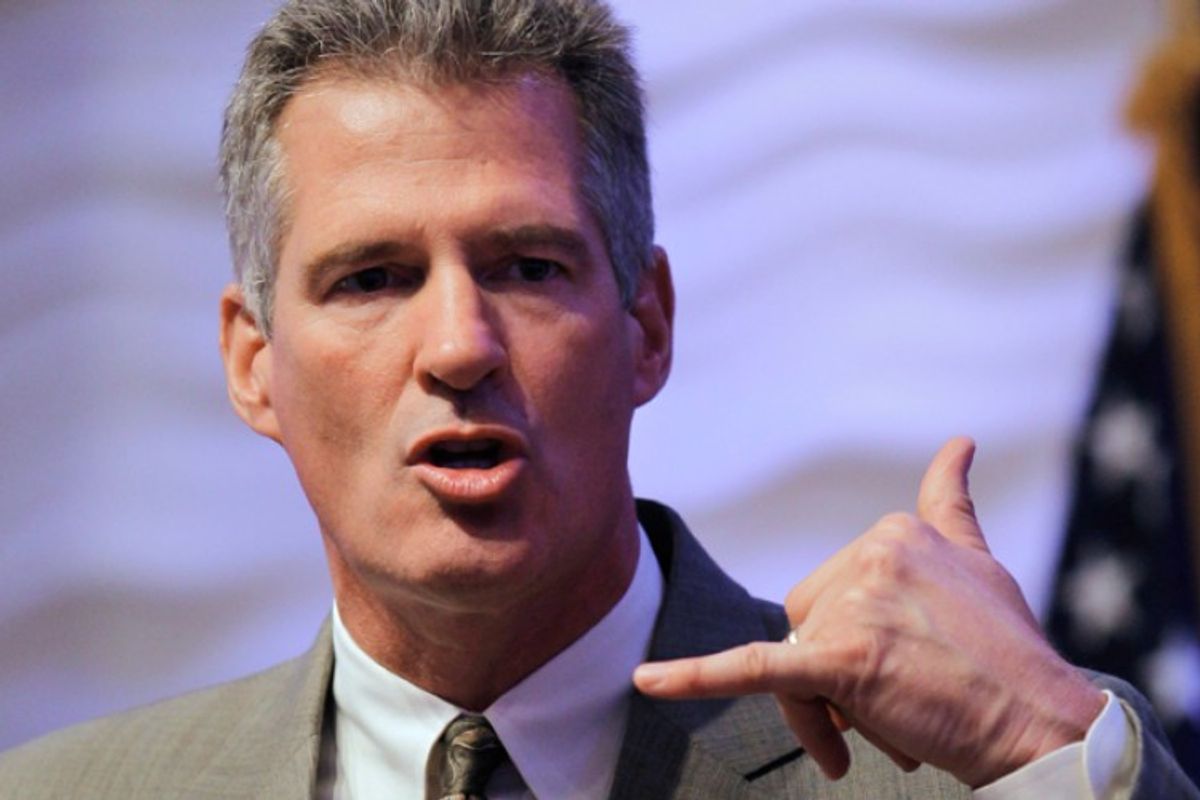Following up on today's dissection of Scott Brown’s foreign policy vision (panic about ISIS, close the border), it’s worth taking a closer look at one area in which Brown claims to have been prescient: the 2011 withdrawal of U.S. forces from Iraq. Brown argued in his big foreign policy speech yesterday that the U.S. should not have completely withdrawn from Iraq, and suggested that had we left a residual force behind it would have prevented the rise of ISIS. That’s a highly dubious argument based on a sanitized history of what actually led up to the final withdrawal of American forces – and Brown knows that he’s not being completely honest.
As I wrote this morning, Brown omitted two very important pieces of information from his critique of President Obama’s (and, by transitive property of politics, Jeanne Shaheen’s) Iraq withdrawal policy. The first is the fact that Obama was adhering to a deadline agreed upon by President Bush and the Iraqi government to have all troops withdrawn by the end of 2011. The second is that the Iraqi government would not agree to legal protections that U.S. commanders felt were necessary if a residual force was to be left behind. By slicing these facts out of the narrative, Brown was able to argue that he argued for the correct course but the administration just wouldn’t listen.
“Three years ago, in October of 2011, I joined with colleagues on the Armed Services Committee in a letter challenging the administration to reconsider the complete abandonment of the Iraqi people,” Brown said yesterday in New Hampshire. “It was obvious to us, and to the commanders we had spoken to over there, that a residual force was essential to preserve America’s hard-won gains.”
That letter is here, and in it Brown and his then-colleagues requested “a hearing of the full committee as soon as possible to understand the rationale for this decision that apparently ends negotiations between the United States and the Government of Iraq on a long-term training and stability force of sufficient size to protect both U.S. and Iraqi enduring national security interests.”
That hearing took place on Nov. 15, 2011. Then-Secretary of Defense Leon Panetta and chairman of the Joint Chiefs of Staff Martin Dempsey sat before the full Senate Armed Services Committee and fielded questions from its members, including Brown. John McCain, then the ranking member of the committee, got into an argument with Panetta over the issue of legal protections for a residual U.S. force. McCain made the case that the Obama administration had deliberately negotiated in bad faith with the Iraqis to scuttle any chance of leaving a force behind. Panetta strongly objected. “This is about negotiating with a sovereign country, an independent country,” Panetta explained to McCain. “This was about their needs. This is not about us telling them what we are going to do for them or what they are going to have to do for us.” Dempsey, during an exchange with then- Sen. Joe Lieberman, backed up Panetta. “At the end of the day, the Iraqi prime minister deemed that he wanted to rely on the security agreement,” he said.
When Brown’s turn to ask questions came around, he returned to the issue of leaving a residual force. Panetta, already exasperated from dealing with McCain’s theories, let Brown have it. “I have to stress to you, Senator, that it can only happen if the Iraqis agree that it should happen,” Panetta said. “I understand that,” Brown replied.
But Panetta wasn’t done. “I know, but I get the impression here that somehow everybody is deciding what we want for Iraq and that that is what should happen. But it does not work that way. This is an independent country,” Panetta explained. “I understand that,” Brown said again before scurrying away from the issue entirely.
That was then, when Brown claimed to “understand” that leaving a force behind was contingent on Iraqi approval and willingness to deviate from the agreement they signed with Bush. Now, Brown has conveniently forgotten all that and is trying to win on foreign policy by taking up an argument that, as explained to him by the secretary of defense and the chairman of the Joint Chiefs of Staff, doesn’t make sense.



Shares